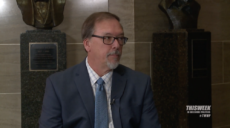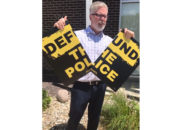JEFFERSON CITY, Mo. — On Monday, Governor Eric Greitens announced 50,000 more drug disposal pouches have been donated from Mallinckrodt Pharmaceuticals. The pouches are free for the public and designed for prescription drug users to be able to sustainably dispose of their excess drugs to prevent a possible addiction. Since their announcement in October of last year, the company says that it donated 400,000 drug pouches to places around the state.
The Missouri Department of Health and Senior Services (DHSS) announced in late July that it will be working with local public health agencies as well as some other organizations to distribute the Mallinckrodt drug disposal pouches. DHSS also announced that Butler, Barton, MacDonald, Jasper, and Newton counties have been selected to receive the initial distribution.
One of the few organizations in Missouri tasked with the distribution of the drug disposal pouches is the Butler County Health Department. Administrator of the department, Robert Hudson, estimates that he will receive around 10,000 to help combat a drug problem that has affected all parts of the country.
A national survey published in the JAMA Internal Medicine journal showed that 6 of 10 adults who use opioid medications expect to have leftover pills. The green pouches are about the size of the iPhone 7 and, with water, can turn 10-15 pills into a black compound that is safe for disposal. The pouches are designed to change the chemical compounds of the drugs to make them safe for a landfill, preventing them from seeping into Missouri groundwater.
Specifically, Hudson wants to focus on individuals with excess pills so they can be immediately and safely discarded. “We’re very optimistic. We think with the appropriate education and getting them in the hands of people who have excess opioids… We do believe there will be an immediate reduction within a month or two of the available prescription drugs in medicine cabinets,” he predicts.
Hudson plans on distributing the pouches at schools, pharmacies, churches, treatment centers, and other local community partners. In addition, he hopes that an online and traditional media campaign can help him educate the community.
“We want to make sure they are used appropriately… we want them out; we want them used. … Don’t just dump your pills in your toilet, don’t dump them in the sink. They can get in the water supply,” Hudson cautions.
In July, Governor Greitens signed an executive order to create a Prescription Drug Monitoring Program (PDMP) after a bill stalled in the general assembly. Missouri is still the only state in the union without a true statewide database which could track users from buying too many drugs or doctors from overprescribing. The state legislature is hesitant to implement such a database to protect Missourian’s personal privacy. However, individual cities and towns can receive federal money if they create their own local monitoring program.
Safe and Strong Missouri, a coalition of about a hundred supporting organizations, individuals, and health care providers was founded to reduce Missourians addiction to prescription drugs and opiates. The group, partially financially supported by the opioid producing Mallinckrodt, feels that the pouches help combat the Missouri’s opioid addiction and encourages counties and towns creating their own PDMP program.
“I think the governor’s executive order for some kind prescription drug monitoring is a step in the right direction, we believe that counties should move forward with implementing a county by county prescription drug program,” Executive Director of the organization Aaron Baker advised. To him, the pouches are just one “tool in the toolbox” to fight a problem that kills an average of 78 Americans a day.
Most of southeast Missouri, including Butler County, has recently joined or in the process of joining the St. Louis county PDMP. Hudson says the program will start September 1st.
“With some PDMP, with some education, the medication disposal kits, [they all] can get some prescription drugs off the street, out of the way,” he says. “We’re opening the door for law enforcement and other entities to come in and start looking for inappropriate or illegal operations.”
Sergeant Sean Griggs of the Missouri State Patrol’s Division of Drug and Crime Control says there’s a definite need in Missouri for adequate drug disposal systems. He advises that citizens with excess drugs can take them to drug disposal boxes at local law enforcement agencies. For Griggs, Missouri’s drug problem is complicated and needs to be addressed in many different ways.
“We’re not going to be able to solve this problem with just one facet. It can’t just be enforcement and it can’t just be education and it can’t just be commercials. It needs to be a full pronged approach… We’re not going to arrest the problem away,” Griggs advises.
Michael Layer is a reporter for the Missouri Times and the Missouri Times Magazine. He joined the Missouri Times in August 2017 after graduating from Goucher College the previous May. To contact Michael, email michael@themissouritimes.com or follow him on Twitter @_MichaelLayer
































